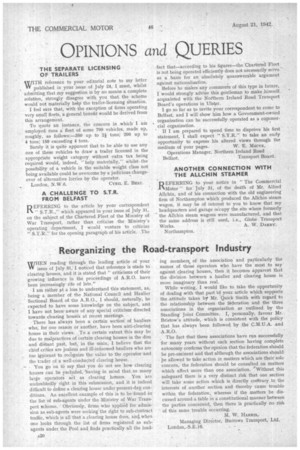Reorganizing the Road-transport Industry
Page 22

If you've noticed an error in this article please click here to report it so we can fix it.
%JHEN reading through the leading article of your, VT issue of July 31; I noticed that reference is Made to clearing houses, and it is stated that " criticisms of their growing influence in the proceedings of A.R.O. have been increasingly rife of late.' I am rather g a loss to understand this statement, as, being' a member of the National Council and Haulier Sectional Board of the A.R.O., I should, naturally, be expected to have some knowledge on the subject, and I have not been aware of any special criticism' directed towards clearing house's at recent meetings.
There has always been a certain section of hauliers who; for one reason or another, have been anti-clearing house in their views. To a certain extent this may be due to .malpractices of certain clearing houses in the dim and distant past, but, in the main, I believe that the chief critics are jealous and ill-informed hauliers who are too ignorant to reaignize the value to the operator and the trader of a well-conducted clearing house.
You go on tO say that you do not see how clearing houses can be excluded, 'having in mind that so many large operators act as clearing houses. You are undoubtedly right in this submission, and it is indeed difficult to define a clearing house under present-day conditions. An excellent example of this is to be found in the list of sub-agents Under the Ministry of War Transport scheme. Obviously, firms who applied for admission as sub-agents were seeking' the right to sub-contract traffic, which is all that a clearing house does, and, when one looks through the list of firms regiitered as subagents under the Pool and finds practically all the lead
ing members, of the association and particularly the names of those operators who have the most to say against clearing houses, then it becomes apparent that the division between a haulier and clearing house is more imaginary than real.
While writing, I would like to take the opportunity of dealing .with that part of your article which supports the attitude taken 1)31, Mr. 'Quick Smith with regard to the relationship between the federation and the three associations in the organization as outlined by the Standing Joint Committee. I, personally, favour Mr. Bristow's attitude, which is consistent with the policy• that has always been followed by the C.M.U.A. and , The fact that these associations have run successfully for many years without each section having complete autonomy confirms the opinion that the federation should be pre-eminent and that although the associations should be allowed to take action in matters which are their sole concern, the federation should be consulted on matters which affect more than one association. 'Without this safeguard there is a very distinct risk that one section will take some action which is directly corttrary to the interests of another section and thereby cause trouble within the federation,, whereas if the matters. be discussed around a table in a constitutional manner between the parties concerned, then there is practically no risk of this same trouble occurring.
M. W. HARRIS,.
Managing Director, Burrows Transport, Ltd. London,.S.E.16.




















































